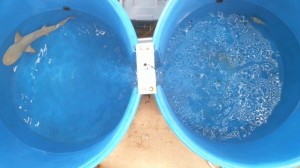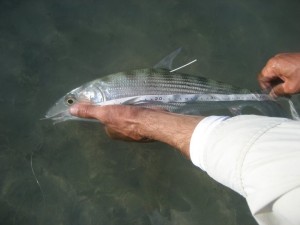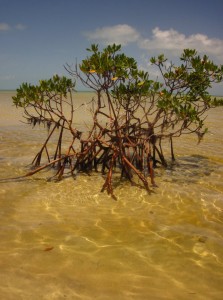The Flats Ecology and Conservation Program is continuing to move forward on several lab-based experiments, as well as adding some new work to the agenda for this spring:
 -Shuttlebox: To test behavioral avoidance of flats fishes to changes in water pH and temperature in relation to climate change, the Flats program is continuing with its shuttlebox trials. Researchers are manipulating water conditions to determine the avoidance threshold of bonefish, yellowfin mojarra, checkered puffer, and schoolmaster snapper to increasing water acidity and temperature. To better understand the ecological implications of avoidance thresholds, a predator (in this case, juvenile lemon shark) is included as part of the experiment, forcing individual fish to choose between changing water conditions or risk of predation.
-Shuttlebox: To test behavioral avoidance of flats fishes to changes in water pH and temperature in relation to climate change, the Flats program is continuing with its shuttlebox trials. Researchers are manipulating water conditions to determine the avoidance threshold of bonefish, yellowfin mojarra, checkered puffer, and schoolmaster snapper to increasing water acidity and temperature. To better understand the ecological implications of avoidance thresholds, a predator (in this case, juvenile lemon shark) is included as part of the experiment, forcing individual fish to choose between changing water conditions or risk of predation.
-The Bahamas Initiative: The Bonefish tagging program will continue through 2013, with increased tagging efforts aimed at North Eleuthera, and a proposed tagging trip to Grand Bahama this c oming April.
oming April.
-Connectivity of Mangrove Ecosystems: Mangrove creeks across The Bahamas and the Caribbean are highly fragmented by the construction of access roads. Preliminary data is being collected by the Flats program to assess how these roads impact hydrology and ecology of these systems, with the intention of identifying restoration priorities in South Eleuthera.
-Mangrove Propagation: In conjunction with the CEI Permaculture Program, new methods for the propagation and transplant of mangroves are being developed. The goal of this initiative is to produce cheap, effective, transplantable and locally sourced mangrove propagation pots for the use of beach stabilization around the CEI campus, as well as for restoration of local mangrove creeks.
-Swim Tunnel and IButtons: Throughout the spring, swim tunnel trials will continue to collect data on bonefish (Albula vulpes) critical swimming speeds and metabolic rates, as they relate to temperature. This spring will hopefully yield some very interesting results as water temperatures begin to increase towards their summer maximums. In concordance with the swim tunnel work on thermal biology, the bonefish that were surgically implanted with temperature loggers (IButtons) last spring 2012 are slowly being recaptured from their mangrove habitats. Not only will this data contribute to a master’s of science thesis through Carleton University, but it will also expand our knowledge of bonefish environmental physiology and serve as a basis for understanding the potential consequences of climate change induced warming nearshore habitats.